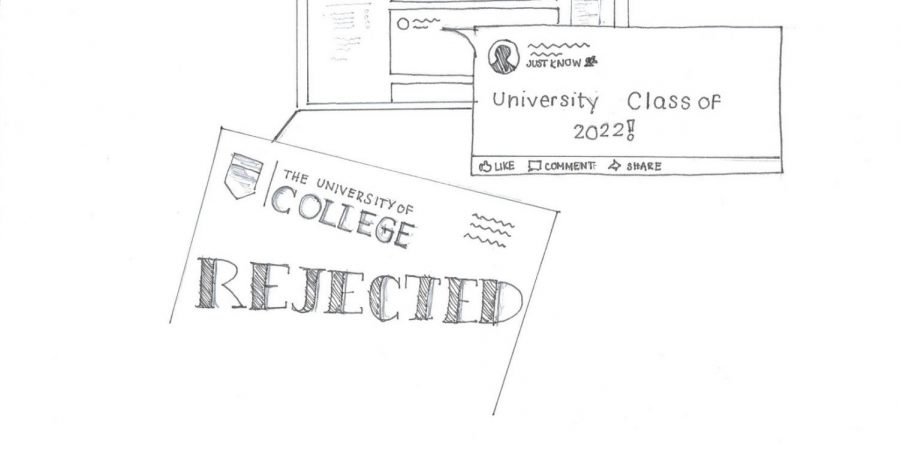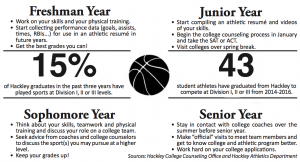Should Seniors post college decisions/acceptance?
Credit: Illustrations by Lei Anne Rabeje
After weeks of anticipation, high school seniors who applied Early Decision or Early Action are nervously, excitedly, and patiently receiving decisions from colleges. A majority of these decisions are typically sent out in the month of December, resulting in a range of emotions.
For those who are denied or deferred from their top school or schools, this can be an incredibly difficult time. Those who receive positive news will be excited for a number of reasons, such as the end of a long college process and excitement for the future. In this excitement, students understandably want to share their good news with family, friends, and teachers who have helped them through the process. In this euphoria, some seniors take to various social media platforms such as Facebook and Instagram to share their news.
The desire to share good news is natural. A study done by The New York Times on “social sharing” shows that informing others of your own good fortune not only boosts happiness, but helps you connect with others, increase self fulfillment, express your personality, and even entertain others. While we may not be sharing with one of these specific purposes in mind, they do contribute to our urge to share. It makes sense why seniors want to share the positive news of their college decision – especially with those who have supported them throughout the process and have enabled them to succeed.
It also makes sense why seniors may want to discuss their peers’ college decisions and celebrate their success. However, seniors also tend to discuss their peers who have heard bad news. They even engage in analysis of why certain people were not accepted, or talk about possible outcomes of those who are waiting to receive decisions.
The issue is less about whether or not seniors should share their news or discuss college acceptances, but rather how. Seniors by all means should share news with others and celebrate their peers, but they should consider the means by which the topic of college decisions is approached.
Outside of social media, and the hundreds of followers many people have on various platforms, seniors will most likely be sharing their good news with those who they want to know, and feel should know. They will be sharing with close friends and teachers at school, at home with family, and by personal phone calls or text messages with loved ones.
By posting on social media, seniors are not only reaching the group of people who are already informed, and those the individual feels should know, but a large group outside of their “important circle.” Outside of this circle are people who do not necessarily “need” to know – if they did, the individual would have informed them. When posting college decisions, seniors also do not know the circumstances their social media followers are in.
There is a large possibility that by posting college acceptances students may harm their peers. While facebook posts do warrant genuine congratulatory messages online, those same gestures will most likely be made in person as well.
As harsh as this may sound, quite simply, many seniors do not get into the college(s) of their choice. For those who are not admitted, handling this news is incredibly difficult. For those who may have received bad news from the same college as an “acceptance sharer,” or even different colleges, it can be challenging to see these social media posts. They dreamed of the same result and are experiencing a type of mourning. A large collection of acceptance posts present across social media platforms can also contribute to students’ anxiety who have either received bad news or haven’t even applied yet, and are planning on sending regular decision applications.
Seniors also tend to discuss both the positive and negative outcomes of their peers at school. In spaces such as the senior lounge, library, or hallways, bits of these conversations can be overheard either by the individual being discussed, or a close friend. It is not only harmful to discuss others personal outcomes, but the discussion of the topic can be hurtful to individuals and Hackley’s culture.
The manner in which decisions and acceptances are discussed, and the reactions they receive, can also perpetuate harmful ideas which promote the importance of “highly selective” schools. Placing value behind people’s acceptance to a “selective” school often happens. This draws away from the most important aspect of the whole college process – finding a school which is the best fit for an individual regardless of its supposed reputation.
It is important for seniors to respect their peers and one of the most difficult parts of the college process to navigate. By discussing outcomes, students ignore the possibility that their conversations can do harm.
In regards to social media posting, Hackley college counselor Peter Latson, stated that, “we (College Counseling) are not saying you can’t or shouldn’t post the college you’re going to attend on social media…we simply think it is worth considering how you act online and how that may affect your friends and community in this particularly stressful time.” Mr. Latson said that from College Counseling’s point of view, “the Internet is simply an electronic extension of the hallway, if you will. It is not as much a matter of “whether” you post, but ‘what’ you post and ‘how’… it is about important nuances of communication and community.”
In a meeting with seniors in November, the college counselors shared this view. They asked seniors to act cautiously and kindly when considering how they share and discuss their own news, as well as the outcomes of others.
During students’ junior and senior years, the college counselors give advice about how to handle sensitive and personal topics such as test scores and the likelihood of acceptance to schools. The college counselors have suggested in the past to seniors that these topics are best to not be discussed, as there are more interesting and positive things to talk about. However, if it is discussed, students should utilize respect and caution. Students should apply these same values when dealing with college decisions.
Seniors should avoid posting acceptances and discussing college decisions at length, especially this time of year. Many people’s futures are in limbo and it is important to consider the fact that by discussing or posting a college acceptance you will most likely harm others in the process. While posting and discussing acceptances is very popular, and tempting, it does not necessarily mean it is the best course of action.
As far as social media goes, if you are looking to possibly network and seek other members of your incoming college freshman class, it is best to join Facebook groups or even discreetly set instagram bios to reflect your choice in the spring once all students have received decisions. Engaging in college decision posting and discussion can negatively impact our community, and friends. Before you talk about college decisions in the hallways or press post, think about why you are doing so and how it may affect others.









